Fluke 117 vs 179: Which One’s Best?
-
- Last updated:
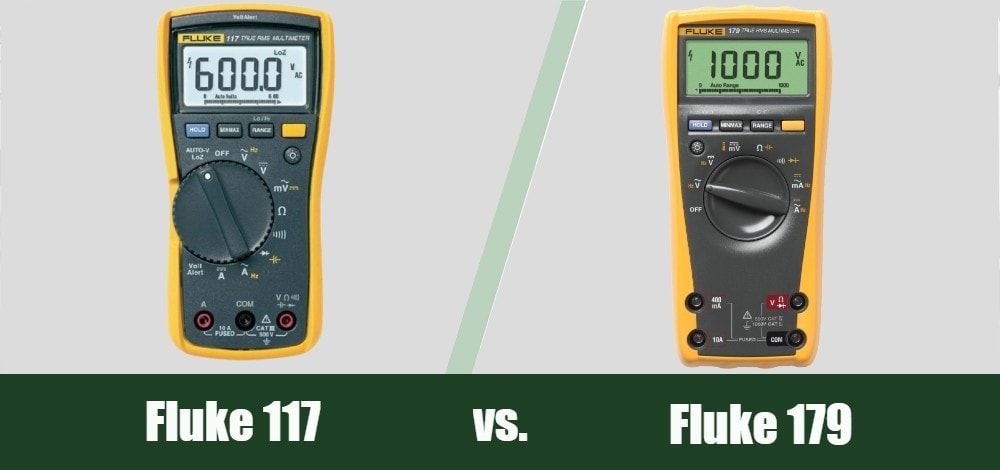

| Rating | Image | Product | Details | |
|---|---|---|---|---|
The Winner
 |
 |
Fluke 179 |
|
CHECK PRICE |
The Runner-up
 |
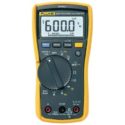 |
Fluke 117 |
|
CHECK PRICE |
The Fluke 117 is an excellent choice for the DIYer or hobbyist who needs the basic functionality of a digital multimeter at an affordable price. It’ll have you covered for simple tasks, such as checking outlets and batteries for juice. Its compact size is another welcome feature. Its CAT rating is in line with most projects that an enthusiast will likely tackle.
On the safety front, the multimeter has an auto-shutoff if it pushes its 10-amp limit for too long. We liked that it comes with both a magnetic hanger and holster to keep it handy. The device has a decent battery life, mainly if you minimize using the backlight feature. The product is well-made, which we’d expect from this manufacturer. It also has a 3-year warranty.
The Fluke 179 takes all of the functionality of the 117 and kicks it up a notch with better accuracy, higher resistance, and greater frequency. The device is well-constructed, with a rugged exterior that is sure to last. The display is large with excellent contrast that makes it easy to read. The voltage tops off at 1000 volts with the same current range.
This device is bigger and heavier. However, those are minor points when you consider what it can do. Like the 117, it is also True RMS with improved accuracy of 0.09%. Auto-ranging is responsive. We loved the fact that you can recalibrate it with a closed case. That takes it a step further as a user-friendly multimeter. Lest we forget, it also comes with a temperature probe that increases its usefulness

At a Glance
Let’s look at the key points of each product.
- Weight: 1.21 lbs.
- Voltage AC/DC: 600 V
- Operating Temp: 50–122℉
- Battery Type: AAA
- Battery Life: 400 hrs
- DC Accuracy: 0.5%
- Automatic Selection: Yes
- Resistance: Up to 40 MΩ
- Capacitance: Up to 10,000 μF
- Frequency: Up to 50 kHz
- Safety Rating: CAT III 600 V
- Warranty: 3-year
- Weight: 2 lbs.
- Voltage AC/DC: 1000 V
- Operating Temp: 50–122℉
- Battery Type: 9V
- Battery Life:
- DC Accuracy: 0.09%
- Automatic Selection: No
- Resistance: Up to 50 MΩ
- Capacitance: Up to 10,000 μF
- Frequency: Up to 100 kHz
- Safety Rating: CAT III 1000 V, CAT IV 600 V
- Warranty: Lifetime
Overview of the Fluke 117
User-Friendly Operation
The manufacturer designed this product with the beginner in mind. The operation is intuitive with desirable features like the auto-shutoff and automatic selection of the current. It has a comfortable hand feel with its compact shape that you can use one-handed. It’s feature-rich for the price. It comes with a 3-year warranty and excellent customer support.
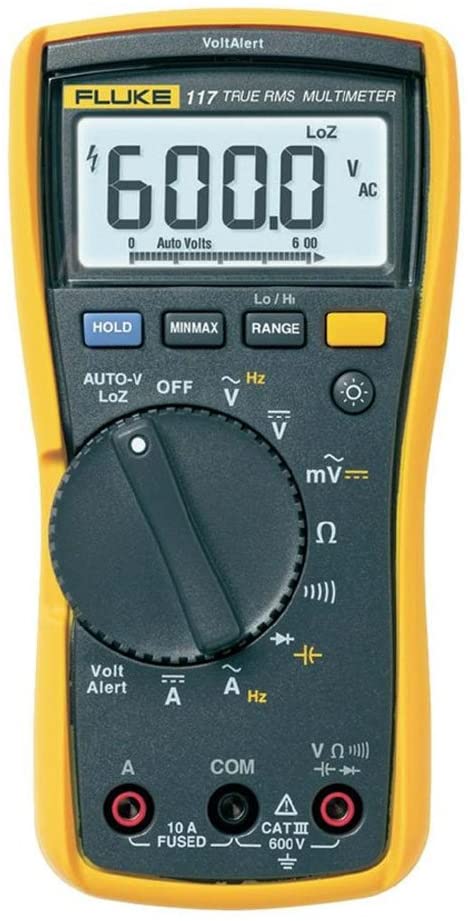
VoltAlert Detector
This proprietary technology makes non-contact voltage detection, which is a boon for DIYers new to doing this kind of work. It’s also a timesaver since you can get the info you need without taking something apart first or contorting like a pretzel to get close enough to get the reading. Combined with its AutoVolt feature, the serious amateur will have an excellent tool for these tasks.
FAQs
What can’t the Fluke 117 do?
Knowing what you can expect from a multimeter is a smart first step toward picking the right device for the work you do. This model covers the basics. However, it cannot detect temperature, nor can it measure milliamps. That said, this product is an excellent choice for any electrical project. The safety rating is adequate for the amateur. Going into the CAT IV range is a pro job.
What can you do with this device?
The Fluke 117 can measure AC/DC voltage. The accuracy is adequate for most DIY projects that don’t require you to get near the power source. Other everyday tasks include diode testing as well as measuring resistance and frequency. While it may seem spendy, the price is reasonable, considering the features and accuracy.
- True RMS
- Affordably priced
- Non-contact voltage detection
- Easy to use
- Poor backlighting
- Fair quality leads
- No CAT IV rating

Overview of the Fluke 179
Superior Accuracy
The accuracy between the two products seems minuscule at 0.5 versus 0.09%. That’s true for most DIY projects. However, the Fluke 179 is a device geared toward the professional, with additional functionality. It’s evident in the greater voltage and frequency ranges. There’s also that leap into the CAT IV pond with a 600 V safety rating.
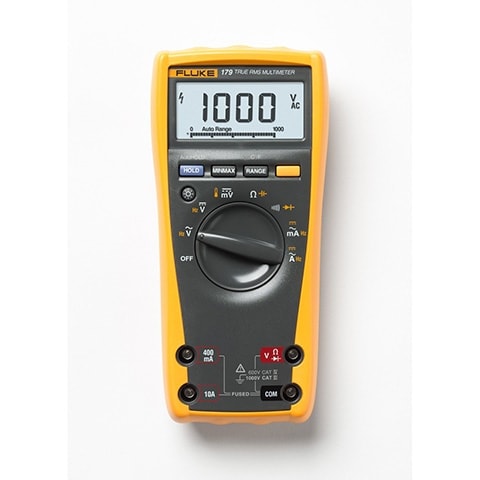
Lifetime Warranty
A precision device like the Fluke 179 has a lot of parts that can go wrong—or at least mess with its accuracy and precision. That’s what makes the lifetime warranty a major selling point for this model. After all, it’s a unit that is built for frequent use in a variety of applications. It’s worth noting that the manufacturer considers the lifetime to be seven years as per the user manual.
FAQs
Is the Fluke 179 worth the money?
The answer to this question isn’t a simple yes or no. It depends on the projects you take on and whether you need the accuracy that this device offers. It’s a wise investment for the freelance contractor who needs its full range of capabilities, including the temperature probe. As far as performance is concerned, the Fluke 179 is worth the cost, hands down.
- Temperature probe
- High accuracy
- Easy-to-read display
- Well-built
- Excellent safety ratings
- Spendy
- Poor-quality leads
What are the differences between them?
Performance
Edge: Fluke 179
The Fluke 179 has better accuracy and versatility, with a very user-friendly interface. However, it’s geared toward the professional. The Fluke 117 is more than adequate for the average homeowner.
Price
Edge: Fluke 117
It’s not a huge amount of money, but the Fluke is considerably cheaper than the 179, ostensibly due to the lesser capabilities. If you don’t need pinpoint precision, the Fluke 117 is the better value.
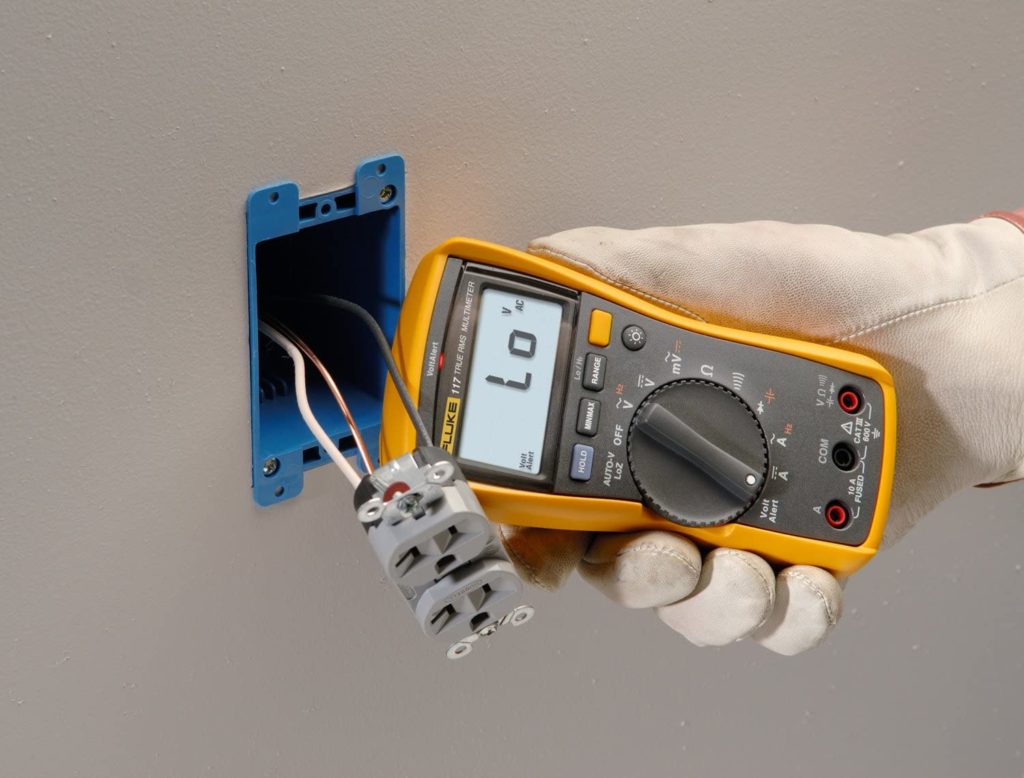
Durability
Edge: None
Both devices are built to last.
Design
Edge: Fluke 179
This category is almost negligible because both devices are very similar. However, the Fluke 117 gets dinged for its poor backlight display, and it’s lack of safety ratings.
What the Users Say
The manufacturer’s reputation is the primary thing that people mention with the Fluke 117 and all of its product line. They are well-made and built to last, which is essential, given its use and associated risks. Comments that it’s easy to use are a frequent occurrence. Many have wondered why they haven’t bought this model in the first place.
The other noticeable thing is the lack of negative feedback. People love this device. We noted particularly the customer loyalty that exists with this brand and this model. Testimonies often speak of getting their second or third one while praising the usefulness of the retired product. To us, that speaks volumes about its quality.
Users love the Fluke 179 for all the reasons that people gravitate toward the 177 and the Fluke brand. It’s a high-quality product that will provide years of reliable service. There’s not much to knock about the 179, other than the price. It is spendy, no doubt. However, if you need this additional functionality, everyone seems to agree that it’s worth the high price tag.

Conclusion
The Fluke 179 is the better of the two devices, but only if you need the extra capabilities that it provides. The average home hobbyist will get by swimmingly with the Fluke 117. The accuracy difference isn’t a dealbreaker unless the job requires it. The manufacturer stands behind both of them with a warranty that says a lot about the quality of the products.
Related Reads:
Contents

